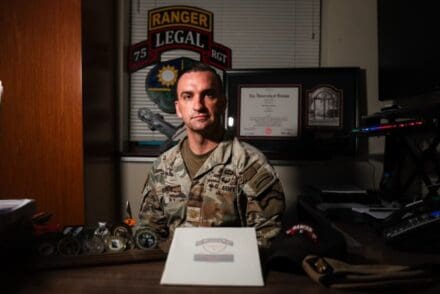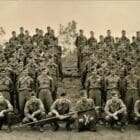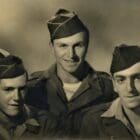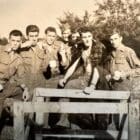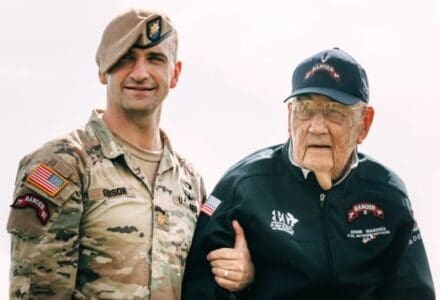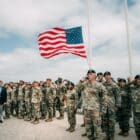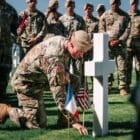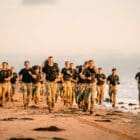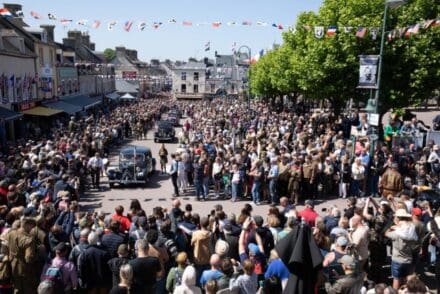WASHINGTON — As Maj. Jack Gibson waited to board a plane to France last Thursday, he thought about his grandfather and what he went through 80 years ago fighting in Europe during World War II as part of the 2nd Ranger Battalion.
This wasn’t a normal work trip for Gibson, a judge advocate with the 75th Ranger Regiment, this one was special he said, because he was taking part in the D-Day anniversary commemoration and getting a chance to walk the same path his grandfather did so many years ago.
“I was inspired by him to become a Ranger,” Gibson said. “He inspired me by the way he lived his life, how he carried himself, and how he treated people. He was someone I emulated and even though he never really talked a lot about being a Ranger, I knew he was proud of it.”
Gibson and his five siblings spent much time with their grandfather, Jim Shalala, as they grew up in Cleveland. They attended church together every Sunday, played cards, and celebrated holidays. They often saw their grandfather at their youth sporting events cheering them on from the stands.
“He just loved being around people, especially his grandkids,” Gibson said.
When it came time for Gibson to decide on his future path, he followed his grandfather and older brothers into military service. In his junior year of high school, he was selected to attend the U.S. Military Academy.
To congratulate his grandson, Shalala gave him the red and black Ranger scroll he wore on his uniform during the war.
“This was something special to him about his time in service, and he wanted me to have it,” he said. “At the time, I didn’t really know what the 2nd Ranger Battalion was or what [the scroll] meant.”
A year later, Gibson’s grandfather, grandmother and sister passed away from injuries sustained in a car crash. They were traveling home from Louisiana after seeing Gibson’s older brother off before a deployment to Afghanistan.
They were all suddenly gone as Gibson started his military journey. He kept his grandfather’s scroll and learned more about the 2nd Ranger Battalion and their role in liberating Europe as his career progressed.
Prior to the war, the U.S. Army didn’t have special operations forces. That changed in 1942 when the War Department authorized the activation of the first Ranger unit. That was followed by the formation of six more units, including the 2nd Ranger Battalion, which was activated in April 1943.
Shalala was drafted in July 1943 and joined the elite infantry unit as a replacement in Normandy, France. He fought alongside his fellow Soldiers during battles in northern France, western Germany and central Europe until victory was declared in 1945.
After graduating college, Gibson entered the Army as a Medical Service Corp officer with the 3rd Infantry Division. There, he led 44 combat medics taking care of more than 700 Soldiers before being accepted into a transition program to become a judge advocate.
He attended the University of Georgia School of Law as part of the program and met his wife, Meredith, while he was there. He was assigned to the 101st Airborne Division at Fort Campbell, Kentucky after finishing school and he continued to learn more about the Rangers.
During a deployment to Afghanistan in 2018, he worked closely with Rangers and learned about a possible career path as a Ranger judge advocate. This fueled his desire even more. When he got home, he told his command he wanted to go to Ranger School.
“Luckily, I had a brigade commander and a supervisor who were supportive of allowing me to do it,” he said.
He went through the Pre-Ranger Course with the 101st before attending Ranger School in the summer of 2019. The 62-day course pushed the 32-year-old Gibson mentally and physically. During the Ranger assessment phase, he got lost leading a night patrol and got recycled, having to start the course all over.
He used his grandfather and his unit as motivation, learning more about the missions they went on and the hardships they endured. He also thought about his wife, who was pregnant with their first child, and his desire to set an example for his family, the way his grandfather had for him.
He pushed through and passed each phase of training earning his Ranger tab.
“I’ll definitely never forget that feeling,” he said. “It was satisfying for sure, but it’s also one thing to get the Ranger tab and it’s a completely other thing to try out for the Ranger regiment.”
That was next on his list and the timing worked out just right. He was promoted to major in early 2021 and a slot opened at the 75th Ranger Regiment at Fort Moore, Georgia that summer. He applied, went through the interview process, and was selected to attend the Ranger Assessment and Selection Program in the fall.
The eight-week course tests Soldiers in two phases. The first phase assesses their strength of character and leadership skills during ruck marches, land navigation exercises and medical first responder tests. The second prepares Rangers for their duties by developing skills for direct-action combat, airfield seizure, personnel recovery, marksmanship, and explosives.
The final test comes in front of a board to find out whether you make the cut.
“I was actually a lot more nervous during this than I was in Ranger School,” Gibson said. “This was something that I really wanted and as the board deliberated it felt like years but was probably only a few minutes.”
The nervous energy subsided as they called him back in to congratulate him on making it into the regiment. He’s now been with the 75th Ranger Regiment for the last two years, getting a little taste of the experience his grandfather got.
“It was a really cool opportunity to wear a similar scroll that my grandfather wore,” he said. “It was kind of a full circle moment for me. It’s been everything I thought it would be and more.”
Topping it all off, Gibson is getting a first-hand look at some of the places where his grandfather fought in France while participating in the 80th anniversary of D-Day commemoration. He’s jumping out of a WWII-era C-47 Skytrain and supporting several ceremonies during the week.
“I’ll certainly never know what he was feeling [during the war,] but literally being able to walk in the same steps as him will be a very revealing experience for me,” he said. “I’m looking forward to it and just plan on soaking in the opportunity.”
By Christopher Hurd, Army News Service



